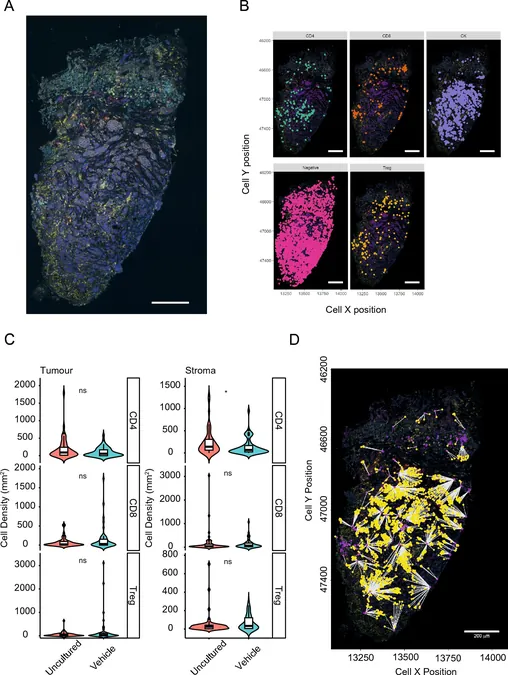
Revolutionary 'Explant' Technique Offers Hope for Predicting Breast Cancer Treatment Success
2025-01-10
Author: Rajesh
Introduction
A groundbreaking development by cancer researchers at the University of Leicester could change the landscape of breast cancer therapy by accurately predicting patient responses to chemotherapy and antibody-directed treatments. This innovative technique, known as the patient derived explant (PDE) method, has been documented in a recent publication in *Scientific Reports*.
Breast Cancer Statistics
Breast cancer stands as the most prevalent cancer among women globally, with an alarming 2.3 million new cases diagnosed each year. Despite major advancements in early detection and treatment options, approximately 670,000 women continue to lose their lives to the disease annually, as reported by the World Health Organization (WHO) in 2022. This statistic underscores an urgent need for more effective therapeutic strategies.
Research Methodology
In their cutting-edge study, researchers employed advanced digital pathology and multi-immunofluorescent techniques to analyze tumor samples derived directly from patients. This approach aims to provide deeper insights into how individual tumors respond to various treatment modalities in a laboratory setting.
Expert Insights
Gareth Miles, a Lecturer specializing in Cancer Patient Derived Explant Technology at the University of Leicester, emphasized the importance of personalized medicine, stating, “While we have made significant strides with targeted therapies for different types of breast cancer, some tumors remain challenging to treat. It's crucial to ascertain how well certain patients' tumors will respond to available therapies to avoid subjecting them to ineffective and burdensome treatments.”
Foundation of Research
The research draws on successful prior investigations involving non-small cell lung cancer and endometrial cancer that established a clear link between explant responses to chemotherapy drugs and patient outcomes. This foundational work paved the way for their examination of breast cancer.
Study Findings
In their latest study, the research team meticulously monitored tumor 'explants' from 55 breast cancer patients, assessing their stability over time. They subjected these explants to treatments with either standard chemotherapy or the HER2-targeted therapy, trastuzumab.
Key Observations
Professor Catrin Pritchard, a prominent figure in Cancer Biochemistry at the University of Leicester, highlighted a key finding: “Our data revealed that the structural integrity of the tumor was maintained for up to 72 hours during the testing, preserving the immune microenvironment. This is particularly exciting as many other testing techniques struggle to achieve this level of accuracy.”
Implications of Findings
By comparing the laboratory observations of these tumor explants under treatment to the actual clinical progression of each patient, researchers found a consistent pattern. The response of the explants mirrored how the tumors behaved in the patients, providing a promising indication that this testing methodology is meaningful.
Conclusion
The findings from this pioneering study suggest that the PDE technique could serve as a feasible preclinical testing platform for specific breast cancer patients. This new approach aims to enhance the accuracy of treatment response predictions, allowing healthcare providers to avoid administering ineffective therapies. This not only saves time but also has the potential to significantly improve clinical outcomes for patients coping with breast cancer.
In a world where personalized medicine is becoming increasingly vital, the PDE technique represents a hopeful step forward in tailoring breast cancer treatments to enhance survival rates and quality of life for millions of women affected by this formidable disease.


 Brasil (PT)
Brasil (PT)
 Canada (EN)
Canada (EN)
 Chile (ES)
Chile (ES)
 Česko (CS)
Česko (CS)
 대한민국 (KO)
대한민국 (KO)
 España (ES)
España (ES)
 France (FR)
France (FR)
 Hong Kong (EN)
Hong Kong (EN)
 Italia (IT)
Italia (IT)
 日本 (JA)
日本 (JA)
 Magyarország (HU)
Magyarország (HU)
 Norge (NO)
Norge (NO)
 Polska (PL)
Polska (PL)
 Schweiz (DE)
Schweiz (DE)
 Singapore (EN)
Singapore (EN)
 Sverige (SV)
Sverige (SV)
 Suomi (FI)
Suomi (FI)
 Türkiye (TR)
Türkiye (TR)
 الإمارات العربية المتحدة (AR)
الإمارات العربية المتحدة (AR)